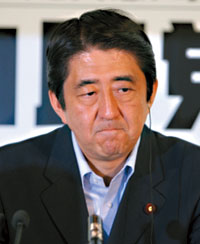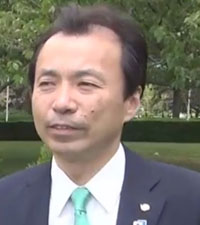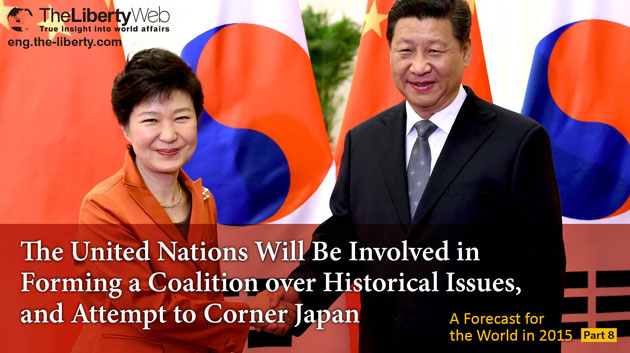The United Nations Will Be Involved in Forming a Coalition over Historical Issues, and Attempt to Corner Japan
A Forecast for the World in 2015 (Part 8)
South Korea’s President Park (left) shook hands with China’s President Xi at the APEC meeting held in Beijing in November, 2014. Photo: Xinhua News Agency/Aflo
The Liberal Democratic Party (LDP)

Makes concessions over historical issues to China and South Korea in bids to prolong the life of the Abe administration
Maintains the Kono and the Murayama Statements
The Happiness Realization Party (HRP)

Restores Japan’s honor by spreading proper historical perceptions
Keeps its distance from China and South Korea
Wishes to retract completely the Kono and the Murayama Statements to mark the anniversary of the end of WW2
In July of 2014, the Chinese President, Xi Jinping, paid a state visit to Seoul where he met with South Korea’s President, Park Geun-hye. At a joint news briefing, Park said, “Next year will be a meaningful year for both countries and other Asian countries as it marks the 70th anniversary of both the victory of the Anti-Fascist War and the liberation of the Korean Peninsula.”
In what way does President Park intend to make 2015 a “meaningful year”? She plans to force Japan into a difficult situation over Korea’s perception of how the world should view WW2 history. Ethnic Korean anti-Japan groups in the U.S. will undoubtedly work closely with her movement and intensify Japan-bashing over issues that have been left to history. Comfort women monuments or statues that Koreans have placing or have been trying to place symbolize this movement.
The Chinese President, Xi Jinping, Is Forming a Coalition against Japan, Using Historical Revisions as Fuel for His Fire
What concerns us most is that ethnic Chinese groups are now working hand-in-hand with ethnic Korean groups against Japan. Considering their influence in the world, the Japanese public should not underestimate the impact on perceptions abroad from the banding together of such groups.
In fact, China has reached a joint agreement with Russia to hold celebratory events to mark the 70th anniversary of the victory in the war against fascism and Japanese militarism, and China has already invited the President of Mongolia to attend its ceremony. China has also proposed to South Korea that it jointly arrange events with China to remember the 70th anniversary of the Korean Peninsula’s liberation from colonial rule.
In June of 2014, China submitted an application to UNESCO in order to add documents relating to the so-called comfort women and the Nanjing Massacre to the Memory of the World Register. Moreover, it has been insisting that commemorating the 70th anniversary of the victory of WW2 be included in the agenda of the U.N. General Assembly to be held in September of this year. China is steadily forming a coalition against Japan using its ideas on how Asian historians should revise the recording of WW2 events.
Prime Minister Abe Accepts the Kono and the Murayama Statements That Allow for a Masochistic View of Japanese History
One problem is that the Abe administration does not even argue with China and South Korea when they try to dissipate outright historical fabrications, and on the contrary, the Abe administration accepts them.
In February of 2014, Prime Minister Abe instructed his cabinet to examine the drafting process of the Kono Statement, which virtually admitted that Koreans had been forcibly taken away to serve as comfort women, and his investigation concluded that the then Japanese and Korean governments jointly drafted the statement. However, PM Abe announced that he would continue to follow the Kono statement without giving any reasons for his strange decision to do so in light of the recent developments.
At the Japan-China summit meeting held in Beijing in November of 2014, PM Abe expressed his intention to follow the Murayama statement as well, which recognized that Japan had indeed invaded Korea and other Asian nations in acts of aggression (not self-defense as was the intention of the then Japanese government officials based upon the Communist threat from Russia). Onlookers considered PM Abe’s stance as grandstanding to show his willingness to improve Japan-China relations and to gain support from the leftist bloc and the financial circle in Japan.
PM Abe has been acting like a sell-out in order to bring an electoral victory to the LDP and to prolong the life of his Cabinet. He even refrained from visiting Yasukuni Shrine on August 15th of last year, on the day that marks the end of WW2. He might not be the leader of spirit that people thought would live up to the conservatives’ expectations. However, this might be a limitation of the LDP itself because it has a lot of pro-China lawmakers.
The Happiness Realization Party Continues Its Efforts to Restore Japan’s National Pride

The Happiness Realization Party
Rev. Yukihiro Oikawa, the Director of the Foreign Affairs Committee
Contrary to the government’s weak-kneed attitude, the Happiness Realization Party (HRP) has continuously addressed the historical issues with a resolute attitude. In the policy of strengthening the nation’s defenses that the HRP advocated in the last Lower House election, the party claimed that anti-Japan groups fabricated the so-called ‘comfort women’ issue and ‘Nanjing Massacre’ after WW2 ended, and that the Japanese government should retract the Kono and Murayama Statements to mark the 70th anniversary of the end of the Greater East Asia War. Making concessions over the revision of historical issues only empowers China’s military expansionism, which will eventually jeopardize the security of Japan.
The HRP has really been active. In 2013, the party carried out a nationwide signature-collecting campaign to retract the Kono Statement. Up until April of 2014, it gathered over 130,000 signatures and submitted them to the Cabinet Office addressed to the prime minister. In July of 2014, it also had a rally to protest China’s application to add the ‘comfort women issue’ and the ‘Nanjing massacre’ to UNESCO’s Memory of the World Register, organizing a demonstration with about 1,700 participants. On August 15th of last year, the day marking the end of the Greater East Asia War, 40 party executives, including the party leader Ryoko Shaku, visited Yasukuni Shrine, expressing gratitude and respect to the spirits of the war dead who sacrificed their lives fighting for the nation.
Rev. Yukihisa Oikawa, the Director of the Foreign Affairs Committee of the HRP, has been working harder than any of the other party members over these historical issues. He went to the U.S. all alone where he received invitations to be on local radio programs as a political commentator. Taking full advantage of his English language ability, he refuted Chinese and South Korean false claims at 6 stations and conveyed proper historical perceptions instead. He received positive feedback from listeners such as, “No one has talked about these issues from a Japanese standpoint,” and “This made me look at the issues in a different way.”
In June of 2014, Rev. Oikawa met with David Lee in New York, President and CEO of the Korean American Public Affairs Committee (KAPAC), one of many ethnic Korean civic groups, with whom he debated the issue of the comfort women. At the meeting, President Lee demanded an apology and compensation from Japan, but Oikawa flatly rejected his demands, saying, “There’s no evidence whatsoever to back up the assertions that women were forcibly mobilized to serve as sex slaves.”
Rev. Oikawa, an active leader on the front lines of the international arena, issued a warning regarding the anti-Japan propaganda campaigns, saying, “The influence of the ethnic Chinese groups, not to mention the ethnic Korean groups, has reached as far as the U.S. government and Congress. The ‘comfort women’ statues that South Korea is trying to set up across the U.S. convey the message in a visible manner, but China is lobbying behind the scenes to sever the Japan-U.S. alliance.”
In order to restore Japan’s long-eroded national pride, the Happiness Realization Party has been taking action to counter hostile propaganda from China and South Korea and to dispel the masochistic view of Japanese history.
Related
- The U.S. “Shale Revolution” Won’t Solve Japan’s Energy Problems
- In 2015, the Shale Revolution Will End Up Being a Fantasy
- China's Economic Crises Will Seriously Have an Effect on Japan
- China Will Conceal Its Economic Crisis and It Will Have a Great Impact on International Economy
- How Will Korea's Anti-Japanese Movement Influence Japan's Image Abroad?



















